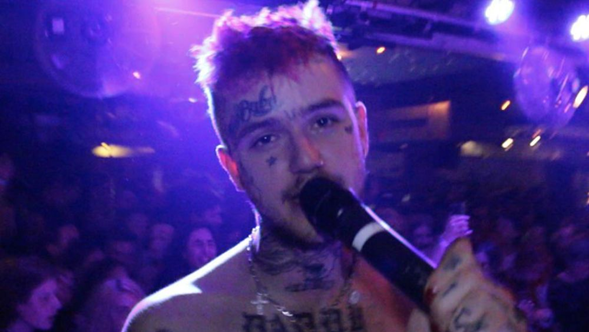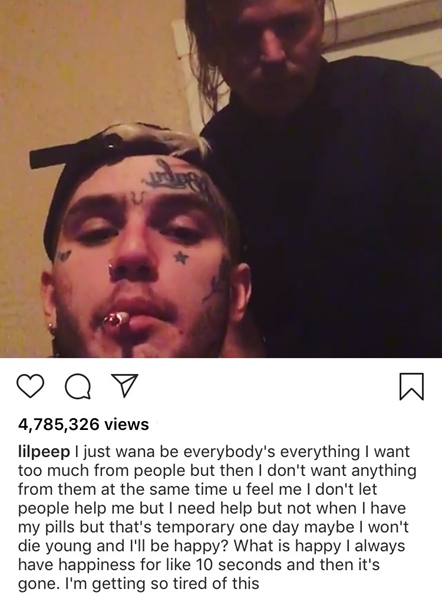I’ll come completely clean. I had the privilege of seeing Gustav Åhr, known by the stage name “Lil Peep,” as given by his mother, at Nature World Night Out in early 2017. Coupled with longtime collaborator Lil Tracy, he was opening for the now disbanded Secret Circle. GOTHBOICLIQUE (GBC) was a scene I wasn’t yet hip to, but was adjacent to for being a fan of the often-ridiculed “sad rap” movement. Sadly, I recognized who Lil Peep was but remained, at the time, skeptical of his work. I was merely bemused whilst in a sea of a thousand fans all singing along to the morose ballads of one of the scrawniest, most tattooed figures I’ve ever seen. Upon the internet’s recommendation, my first listen beforehand was of 2016’s HELLBOY and I promptly, unjustly dismissed it outright. Ever since seeing him perform and hearing the news of his death soon after, I’ve been haunted by the guilt of not fully appreciating Peep when he was present just right in front of me. Our previous site even had a tribute article for him that I dared not looked at out of complete shame. Then this documentary, produced by Terrence Malick of all people, covering Peep’s legacy came to attention and a slight glimmer of redemption for me came with it. If not that, then the smallest bit of closure would be satisfactory to ease the unrest in my soul.

Directors Sebastian Jones and Ramez Silyan do an excellent job in chronicling Åhr’s short but incredibly eventful life in EVERYBODY’S EVERYTHING. Letters to Peep from his loving historian grandfather John Womack, complete with his own touching voiceover, serve as a narrative backbone in guiding audiences both familiar and unfamiliar through the artist’s glorious highs and tumultuous lows. Early on, home videos and extensive interviews with his mother, Liza Womack, reveal a Long Island upbringing where Peep was quickly established as an outcast. Despite getting good grades, disinterest had him rarely attending school, where his creativity was stifled. After getting caught in the middle of his parents’ failing marriage at 14, apathy consumed him as his father became largely absent in his life. Like many of his generation, the only solace Peep could take was in drugs or going online as he embedded himself into the then-burgeoning SoundCloud scene, ready to put out art fueled by his pain.
A good amount of talent comes out in EVERYBODY’S EVERYTHING to praise Peep and tell how they saw a spark in him as he moved on to bigger things in Los Angeles. Ghostemane and J-Green detail Peep’s brief stint in Schemaposse. Slug Christ and the aforementioned Lil Tracy extrapolate on their constant collaborating with Peep and witnessing his rise to fame, as well as the damage it did to him. The lot of them recognize how Peep outgrew them, yet don’t dare resent him. Peep, as sensitive as he was, didn’t have the heart to tell those who were mooching off of him or even living in his house in LA to bugger off. Thus, they deeply lament the loss of Peep, as they knew him for more than a rising star. It’s a sight to see ILOVEMAKONNEN, in particular, get intensely choked up recalling their time together during what could have been Peep’s break into the mainstream. With lyrics like “I don’t wanna go back there / Everybody so fake / Everybody act like they care / Take me, away from here” and “Sometimes life gets fucked up / That’s why we get fucked up / I can still feel your touch / I still do those same drugs,” on hooks no less, it was apparent that Peep drew from a source of true pain that could resonate with listeners. And hearing those tracks through a theater’s sound system puts that emotional depth to the forefront. The signs were there, yet they failed to save him.

It’s pretty dark to see that, as EVERYBODY’S EVERYTHING goes on into Peep’s downward spiral, various managers and music moguls become the main talking heads. Home video archival footage makes way for the slew of social media posts from Peep in the days leading to his death, including the Instagram description where the film gets its name. His meteoric rise to fame even landed him at the center of Europe’s fashion scene, yet Peep remained discontent, with only drugs offering temporary peace. And his growing celebrity status definitely made them more present in his life. It eventually became too much to bear, and once returning to the states for a tour, he was found dead from overdose in the back of his bus in Tucson. In the closing minutes of its tribute, EVERYBODY’S EVERYTHING highlights the mystery surrounding Peep’s death, though it provides no clear answers. The aforementioned J-Green is adamant in his point saying it’s extremely suspicious how Peep, an artist who was seemingly going to change the world, laid dead for nearly four hours unattended. But even more determined is former GBC member Mackned, who pleads his innocence after misguided, vengeful Peep fans wrongfully pin him as the culprit. It just goes to show how much of an impact Lil Peep had on so many lives.
I was evidently a fool for doubting you, Lil Peep, and for that I am truly sorry. It’s sad to barely realize it now, but that’s on me. There’s no weirder feeling, though probably not as bad as being the villain of one, watching a documentary desperately hoping not to see a shot of your own miffed face. Thus, in watching EVERYBODY’S EVERYTHING, I’ve learnt a powerful lesson: to not so quickly judge how one expresses their own pain. Thank you to Jones, Silyan, and Malick for putting this beautifully fitting tribute together, and a special thank you to Gus.
















He was a trashy lowlife. Good riddance. Everytime another SoundCloud rapper dies, god smiles